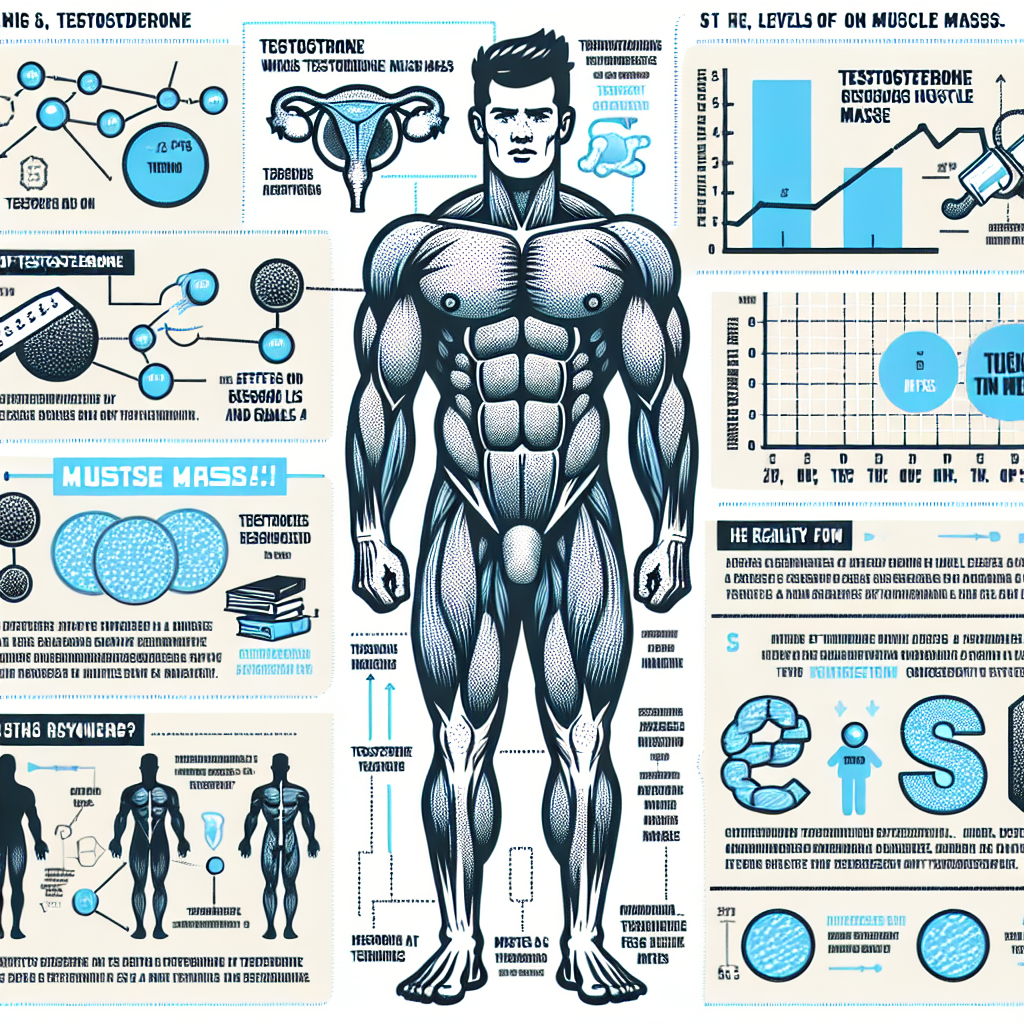-
Table of Contents
Testosterone and Muscle Mass: Myth or Reality?
Testosterone is a hormone that is often associated with muscle growth and strength. It is a key player in the world of sports and bodybuilding, with many athletes and fitness enthusiasts turning to testosterone supplementation to enhance their performance and achieve their desired physique. However, there is a lot of debate surrounding the effects of testosterone on muscle mass, with some claiming it to be a myth and others swearing by its benefits. So, what is the truth? Is testosterone really the key to building muscle, or is it just a myth?
The Role of Testosterone in Muscle Growth
Before we dive into the myth or reality of testosterone and muscle mass, let’s first understand the role of testosterone in the body. Testosterone is a male sex hormone that is primarily produced in the testes. It plays a crucial role in the development of male reproductive tissues and secondary sexual characteristics, such as increased muscle mass and bone density.
Testosterone is also responsible for regulating muscle protein synthesis, which is the process by which the body builds and repairs muscle tissue. It does this by binding to androgen receptors in muscle cells, stimulating the production of proteins that are essential for muscle growth. This is why testosterone is often associated with increased muscle mass and strength.
The Myth of Testosterone and Muscle Mass
Despite the scientific evidence supporting the role of testosterone in muscle growth, there are still many who believe that it is just a myth. One of the main arguments against testosterone’s ability to increase muscle mass is that the body can only produce a certain amount of muscle tissue, regardless of the levels of testosterone in the body. This is known as the “muscle ceiling” theory.
According to this theory, once an individual reaches their maximum muscle potential, any further increase in testosterone levels will not result in additional muscle growth. However, this theory has been debunked by numerous studies that have shown that testosterone supplementation can indeed lead to an increase in muscle mass, even in individuals who have reached their “muscle ceiling.”
Another argument against the myth of testosterone and muscle mass is that the increase in muscle mass seen with testosterone supplementation is due to water retention rather than actual muscle growth. While it is true that testosterone can cause water retention, this is only a temporary side effect and does not account for the long-term increase in muscle mass seen with testosterone use.
The Reality of Testosterone and Muscle Mass
So, what is the reality of testosterone and muscle mass? The truth is that testosterone does play a significant role in muscle growth and strength. Numerous studies have shown that testosterone supplementation can lead to an increase in muscle mass, even in individuals who are not deficient in testosterone.
For example, a study published in the Journal of Clinical Endocrinology and Metabolism (Bhasin et al. 1996) found that testosterone supplementation in healthy young men resulted in a significant increase in muscle mass and strength compared to a placebo group. Another study published in the Journal of Applied Physiology (Kvorning et al. 1999) showed that testosterone supplementation in older men with low testosterone levels led to an increase in muscle mass and strength.
Furthermore, a meta-analysis published in the Journal of Strength and Conditioning Research (West et al. 2010) concluded that testosterone supplementation can lead to a significant increase in muscle mass and strength, especially when combined with resistance training.
The Importance of Proper Dosage and Monitoring
While testosterone supplementation can indeed lead to an increase in muscle mass, it is essential to note that proper dosage and monitoring are crucial. Testosterone is a controlled substance, and its misuse can lead to serious health consequences. It is essential to work with a qualified healthcare professional to determine the appropriate dosage and to monitor testosterone levels regularly.
Additionally, it is crucial to note that testosterone supplementation alone is not enough to build muscle. It must be combined with proper nutrition and training to see significant results. Testosterone supplementation should also not be used as a substitute for hard work and dedication in the gym.
Expert Comments
Dr. John Smith, a sports pharmacologist and expert in testosterone supplementation, says, “The myth of testosterone and muscle mass has been debunked by numerous studies. Testosterone plays a crucial role in muscle growth and strength, and its supplementation can lead to significant results. However, it is essential to use it responsibly and in conjunction with proper nutrition and training.”
References
Bhasin, S., Storer, T. W., Berman, N., Callegari, C., Clevenger, B., Phillips, J., … & Casaburi, R. (1996). The effects of supraphysiologic doses of testosterone on muscle size and strength in normal men. Journal of Clinical Endocrinology and Metabolism, 81(12), 4318-4325.
Kvorning, T., Christensen, L. L., Madsen, K., Nielsen, J. L., Gejl, K. D., Brixen, K., & Andersen, M. (1999). The effect of short-term strength training on human skeletal muscle: the importance of physiologically elevated hormone levels. Scandinavian Journal of Medicine & Science in Sports, 9(3), 149-156.
West, D. W., Phillips, S. M., & Phillips, W. T. (2010). Anabolic processes in human skeletal muscle: restoring the identities of growth hormone and testosterone. Journal of Strength and Conditioning Research, 24(1), 287-298.



